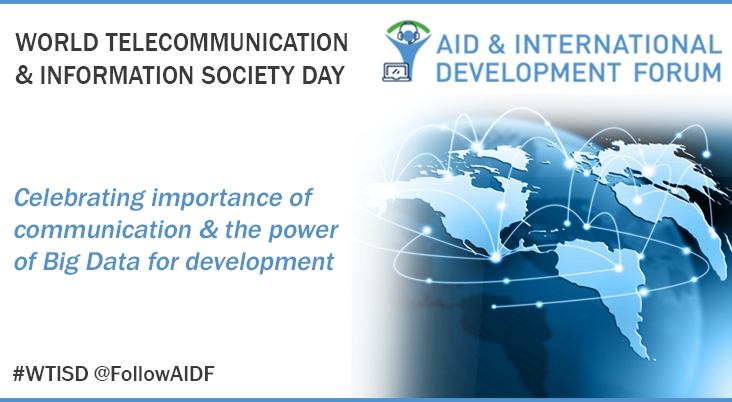The Impact of Big Data on Development and Disaster Resilience

May 17th marks World Telecommunication and Information Society Day bringing awareness and recognition to the impact of advanced analysis and evidence-based decision making. This year’s theme “Big Data for Big Impact” highlights the importance of Big Data on development and converting unstructured and weak quality data into actionable information to support progress towards the 17 Sustainable Development Goals.
Due to technological innovations Big Data covers the great amount and variety of data that we have available today. 98% of today’s data is stored digitally, a significant evolution from the 25% of digitally stored data back in 2000 (Devex.com). 5 billion of the 6 billion mobile phones used across the globe are active in developing countries. This technological accessibility has proven to advance society by allowing free services such as international communication and medical advice to all corners of the globe. Big Data is continually being tested to further advance its capability to address humanitarian and development challenges.
ITU has taken on the initiative to further drive the importance of Big Data. Their overarching goal is to bring attention to the impact of Big Data and strive for further development by making a political difference.
"Countless opportunities will also be identified as we learn to better perfect and harness big data, and understand the impact big data can have as a global good. Activities undertaken by the ITU membership will contribute towards building momentum to embrace big data on a global scale and to seize new opportunities to address development challenges." - Houlin Zhao, Secretary-General, ITU
The Aid and International Development Forum presents Aid & Development Asia Summit (14-15 June, Myanmar) and the Global Disaster Relief & Development Summit (6-7 September, Washington D.C.). The two-day summits bring together development professionals from around the globe to discuss impact of technology and innovations on humanitarian issues and disaster resilience. Be a part of the unique opportunity to network with UN, NGOs, research institutes and governmental leaders to speak about their approaches towards attaining Sustainable Development Goals.
Nway Aung, GIS Manager, Myanmar Information Management Unit, United Nations Development Programme (UNDP) together with Siemon Hollema, Senior Programme & Policy Adviser for Asia & the Pacific, World Food Programme (WFP) and Atiq Kainan Ahmed, Programme Director, Climate Change and Climate Risk Management (CCCRM), Asian Disaster Preparedness Center (ADPC) will look into latest advances in early warning systems, data collection and mapping for aid delivery and disaster resilience in South East Asia.
The importance of shared platforms and data exchange amongst aid and development stakeholders will be discussed by Yanhong Zhang, Chief Population and Social Statistics Section, United Nations Economic and Social Commission for Asia and the Pacific (UN-ESCAP) and Shon Campbell, Manager, Myanmar Information Management Unit (MIMU), United Nations Development Programme (UNDP) and Wivina Belmonte, Deputy Regional Director, East Asia and Pacific Regional Office, United Nations Children’s Fund (UNICEF) as part of the panel on Data Strategy to Support SDGs. They will also look into trends in data collection and management as well as crowd sourcing and open source knowledge solutions. For more information, visit asia.aidforum.org
A combination of crowdsourced data and Big Data produced by government agencies can produce useful information to address disaster response. Joseph Burton, Counselor for Technology and Security Policy at the U.S. Department of State, Chaturvedi Akshat Vishal Mr. Senior Advisor, Disaster Risk Management, World Bank and Hani Shannak, Chief, Information Technology Operations Services at UNICEF have confirmed to speak at the Global Disaster Relief & Development Summit 2017 to discuss role of Big Data analytics and social media mining in finding actionable data in the overwhelming amounts of information following a disaster. For more information, visit disaster-relief.aidforum.org









